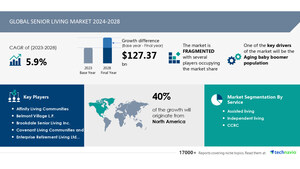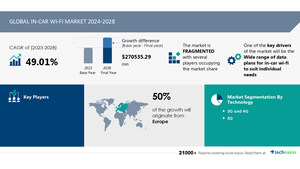NEW YORK, Oct. 30, 2024 /PRNewswire/ -- Report with market evolution powered by AI - The global drowsiness monitoring system market size is estimated to grow by USD 0.51 million from 2024-2028, according to Technavio. The market is estimated to grow at a CAGR of 10.4% during the forecast period. Escalating concerns about road safety is driving market growth, with a trend towards increasing emphasis by vendors on launching new products. However, high likelihood of generating false alarms poses a challenge.Key market players include AISIN CORP., Aptiv Plc, Continental Engineering Services, DENSO Corp., Faststream Technologies, Harman International Industries Inc., HELLA GmbH and Co. KGaA, Infineon Technologies AG, Magna International Inc., Mitsubishi Electric Corp., NVIDIA Corp., OMRON Corp., Optalert Australia Pty Ltd, Panasonic Holdings Corp., Robert Bosch GmbH, Seeing Machines Ltd, Smart Eye AB, Tobii AB, Valeo SA, and Visteon Corp..
Key insights into market evolution with AI-powered analysis. Explore trends, segmentation, and growth drivers- View the snapshot of this report
Drowsiness Monitoring System Market Scope |
|
Report Coverage |
Details |
Base year |
2023 |
Historic period |
2018 - 2022 |
Forecast period |
2024-2028 |
Growth momentum & CAGR |
Accelerate at a CAGR of 10.4% |
Market growth 2024-2028 |
USD 519.07 th |
Market structure |
Fragmented |
YoY growth 2022-2023 (%) |
10.2 |
Regional analysis |
North America, Europe, APAC, Middle East and Africa, and South America |
Performing market contribution |
North America at 35% |
Key countries |
US, Germany, China, France, and Japan |
Key companies profiled |
AISIN CORP., Aptiv Plc, Continental Engineering Services, DENSO Corp., Faststream Technologies, Harman International Industries Inc., HELLA GmbH and Co. KGaA, Infineon Technologies AG, Magna International Inc., Mitsubishi Electric Corp., NVIDIA Corp., OMRON Corp., Optalert Australia Pty Ltd, Panasonic Holdings Corp., Robert Bosch GmbH, Seeing Machines Ltd, Smart Eye AB, Tobii AB, Valeo SA, and Visteon Corp. |
Market Driver
The drowsiness monitoring system market is experiencing a notable trend with key vendors introducing advanced products to comply with safety regulations and enhance driver monitoring systems. In January 2024, Seeing Machines launched the Guardian Generation 3, an upgraded aftermarket Driver Monitoring System (DMS) verified to meet the European Commission's General Safety Regulation for Drowsiness Detection. This system boasts improved microsleep detection and eye-gaze tracking capabilities. In June 2023, Smart Eye showcased its innovative DMS metric, integrating vital sign detection for remote monitoring of drivers' heart and respiration rates. This feature enhances road safety and driver well-being by detecting sudden illnesses or unresponsive behavior. Both companies utilize AI and non-contact, camera-based methods for accurate detection under various lighting conditions. Vendors' focus on new product launches continues to drive market growth, ensuring technological advancements and compliance with evolving safety standards.
The Drowsiness Monitoring System market is experiencing significant growth due to increasing road safety concerns and the integration of advanced driver monitoring technologies in electric and autonomous vehicles. These systems use sophisticated sensors like infrared, steering angle, and vehicle speed sensors, along with algorithms and machine learning, to detect driver distraction and tiredness. False alarms are minimized through multi-modal detection systems, including facial recognition and eye-tracking. Real-time monitoring and alerts help prevent accidents, making vehicle safety systems a priority for fleet management solutions. Road safety awareness is crucial, and traffic accidents caused by tiredness or distraction can be reduced through these advanced technologies. The future of automotive technology lies in driver assistance systems, artificial intelligence, and machine learning, all working together to ensure safer journeys for all.
Request Sample of our comprehensive report now to stay ahead in the AI-driven market evolution!
Market Challenges
- The drowsiness monitoring system market encounters substantial challenges, primarily due to the high occurrence of false alarms. These false alerts can be disruptive and distracting for drivers, potentially compromising road safety instead of enhancing it. Accurately detecting driver drowsiness is intricate and can be influenced by various factors, including environmental conditions and individual differences. Technical challenges include reliably capturing facial and eye features, which can be affected by external factors like bright lights, sudden movements, or changes in posture. These conditions can trigger false alarms, making it difficult for the system to accurately assess the driver's state. Moreover, the limitations of current systems can lead to malfunctions or failures. For instance, bumpy roads or traffic congestion can inadvertently increase driver alertness, while smooth, low-traffic environments may increase driver comfort and the likelihood of drowsiness. This variability poses a significant risk, as the system may either fail to detect drowsiness or generate unnecessary alerts, leading to driver frustration and potential disengagement from the system. Individual differences also impact the effectiveness of drowsiness monitoring systems. Variations in facial features, eye movements, and behavioral patterns can affect the system's ability to accurately detect drowsiness across different drivers. This reliance on technology can sometimes give drivers a false sense of security, leading them to overly depend on system alerts without remaining adequately vigilant. To overcome these challenges, ongoing technological advancements and refinements are necessary to improve the accuracy and reliability of these systems. Ensuring that they effectively enhance road safety without causing undue distraction or annoyance to drivers is crucial. By addressing these issues, the drowsiness monitoring system market can provide a valuable solution to combat driver fatigue and improve overall road safety.
- The Drowsiness Monitoring System market is gaining significant traction due to the increasing road safety awareness and the rising number of traffic accidents caused by drowsiness. Safety measures such as public awareness campaigns, automotive technology, and driver assistance systems are being employed to combat this issue. Advanced technologies like Artificial Intelligence (AI) and Machine Learning (ML) are being integrated into sensor technologies and real-time monitoring systems to detect drowsiness in drivers. Electric and autonomous vehicles, fleet management solutions, and passenger cars are all adopting Drowsiness Monitoring Systems (DMS) to prevent drowsiness-related accidents. These systems use image processing and driver monitoring technologies to detect physiological indicators such as eye movements and steering patterns. However, challenges such as false alarms and the integration of hardware and software components remain. Great Wall Motor and other automotive production companies are investing in DMS to improve automotive safety technology and reduce accidents. The transportation and logistics industries also stand to benefit from these systems, ensuring the health and safety of their corporate fleet and commercial vehicle operations.
Discover how AI is revolutionizing market trends- Get your access now!
Segment Overview
This drowsiness monitoring system market report extensively covers market segmentation by
- Type
- 1.1 Hardware devices
- 1.2 Software systems
- Application
- 2.1 Passenger vehicles
- 2.2 Commercial vehicles
- Geography
- 3.1 North America
- 3.2 Europe
- 3.3 APAC
- 3.4 Middle East and Africa
- 3.5 South America
1.1 Hardware devices- The Drowsiness Monitoring System market is growing due to increasing road accidents caused by driver fatigue. These systems use sensors to detect signs of drowsiness and alert drivers, preventing potential accidents. Companies like Bosch, Honeywell, and Texas Instruments lead the market with innovative solutions. Growing demand from automotive and transportation industries drives market growth. Government regulations and consumer awareness further boost the market.
Download a Sample of our comprehensive report today to discover how AI-driven innovations are reshaping competitive dynamics
Research Analysis
The Drowsiness Monitoring System market is gaining significant traction due to the increasing road safety awareness and the alarming number of traffic accidents caused by drowsiness-related drivers. To mitigate this issue, automotive technology companies are developing advanced driver assistance systems (ADAS) that utilize artificial intelligence (AI) and machine learning algorithms to monitor driver behavior and detect signs of drowsiness. These systems use sophisticated sensors, including cameras and eye movement sensors, to track driver eye movements, steering patterns, and vehicle position. In real-time, the system analyzes this data to determine if the driver is showing signs of drowsiness and issues timely warnings to prevent potential accidents. Corporate fleet management and commercial vehicle operations are also adopting these technologies to ensure the safety of their drivers and reduce the risk of accidents. The integration of facial recognition technology further enhances the system's ability to detect driver fatigue accurately. Electric and autonomous vehicles are also expected to incorporate drowsiness monitoring systems as part of their safety features. Overall, the market for drowsiness monitoring systems is poised for growth as the importance of vehicle safety continues to be a top priority.
Market Research Overview
The Drowsiness Monitoring System market is gaining significant traction due to the increasing road safety awareness and the rising number of traffic accidents caused by drowsiness. These systems use advanced technologies like Artificial Intelligence (AI) and Machine Learning (ML) to detect drowsiness in real-time. Sensor technologies such as infrared sensors, steering angle sensors, and vehicle speed sensors are integrated into these systems to monitor driver behavior and vehicle conditions. DMS or Driver Monitoring Systems are becoming essential components of Automotive Technology, particularly in the context of Driver Assistance Systems (ADAS) and Autonomous Vehicles. These systems use sophisticated sensors and algorithms to detect physiological indicators like eye movements, steering patterns, and vehicle position to issue timely warnings to prevent drowsiness-related accidents. The market for Drowsiness Monitoring Systems is expanding to include Electric Vehicles (EVs) and Commercial Vehicles, with fleet management solutions being a significant application area. The integration of Multi-Modal Detection Systems and Real-Time Monitoring Alerts is expected to further enhance the market's growth. Road safety, corporate fleet management, and commercial vehicle operations are some of the key areas where these systems can make a significant impact on public health and preventive measures. However, the challenge of minimizing false alarms remains a significant concern for the market's growth. The automotive industry, transportation, logistics, and Great Wall Motor are some of the sectors investing in Drowsiness Monitoring Systems to ensure vehicle safety and reduce accidents.
Table of Contents:
1 Executive Summary
2 Market Landscape
3 Market Sizing
4 Historic Market Size
5 Five Forces Analysis
6 Market Segmentation
- Type
- Hardware Devices
- Software Systems
- Application
- Passenger Vehicles
- Commercial Vehicles
- Geography
- North America
- Europe
- APAC
- Middle East And Africa
- South America
7 Customer Landscape
8 Geographic Landscape
9 Drivers, Challenges, and Trends
10 Company Landscape
11 Company Analysis
12 Appendix
About Technavio
Technavio is a leading global technology research and advisory company. Their research and analysis focuses on emerging market trends and provides actionable insights to help businesses identify market opportunities and develop effective strategies to optimize their market positions.
With over 500 specialized analysts, Technavio's report library consists of more than 17,000 reports and counting, covering 800 technologies, spanning across 50 countries. Their client base consists of enterprises of all sizes, including more than 100 Fortune 500 companies. This growing client base relies on Technavio's comprehensive coverage, extensive research, and actionable market insights to identify opportunities in existing and potential markets and assess their competitive positions within changing market scenarios.
Contacts
Technavio Research
Jesse Maida
Media & Marketing Executive
US: +1 844 364 1100
UK: +44 203 893 3200
Email: [email protected]
Website: www.technavio.com/
SOURCE Technavio

WANT YOUR COMPANY'S NEWS FEATURED ON PRNEWSWIRE.COM?
Newsrooms &
Influencers
Digital Media
Outlets
Journalists
Opted In






Share this article